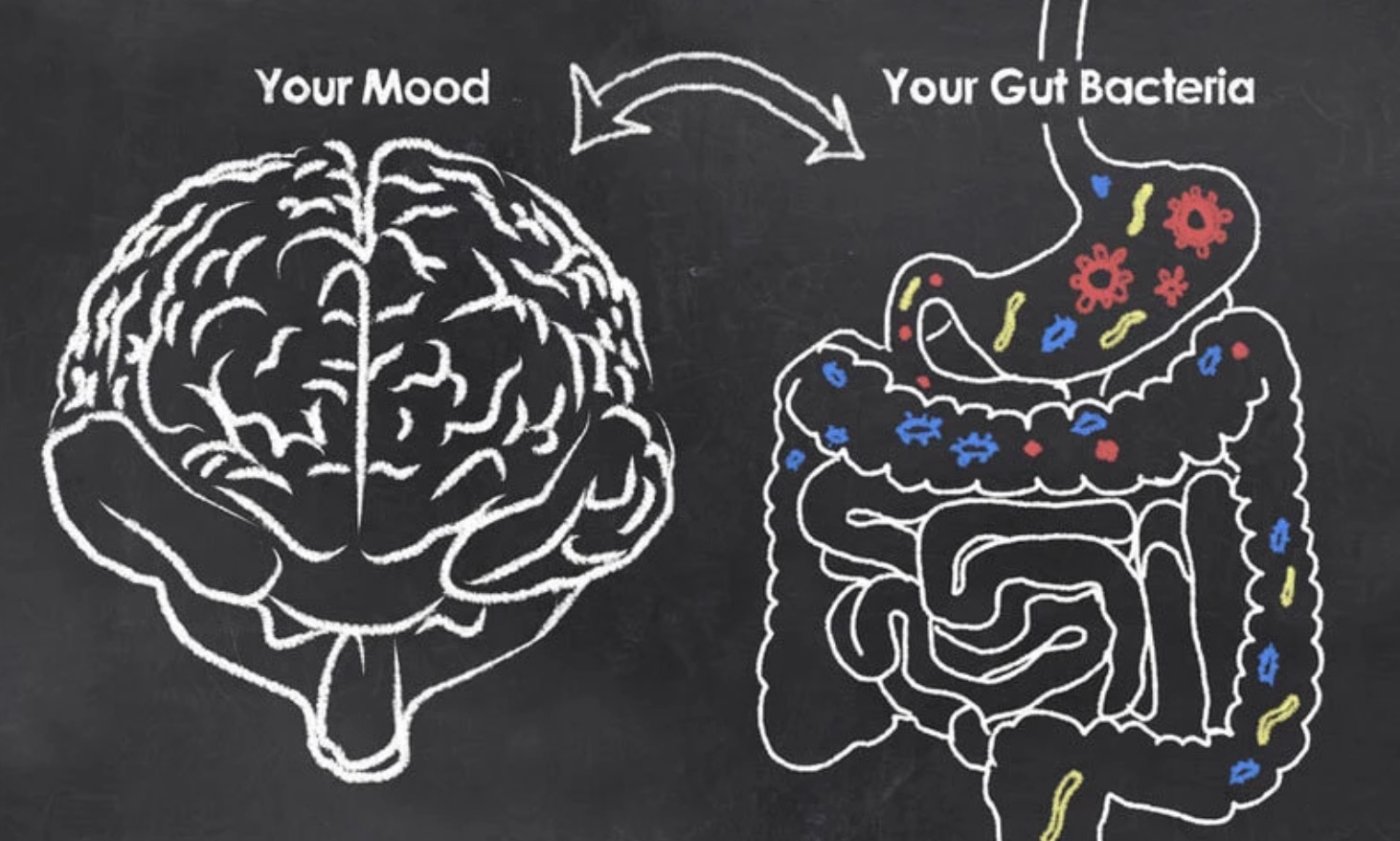
The Connection and Interaction
The gut and the brain are intimately connected. As an example of how sensitive the gut is to emotions, think of how nerves and anxiety will manifest as ‘butterflies in the stomach’.
Impaired gastrointestinal tracts may also cause feelings of anxiety, depression, or stress.
Even your thoughts play a role in the gut. Just the thought of eating encourages your stomach to release digestive juices in preparation to digest the food.
Termed “the second brain”. Interestingly the gut is made from the same type of tissue as the brain.
During foetal development, the brain forms into the Central Nervous System and the gut into the Enteric Nervous System. The two are intimately connected by the biodirectional vagus nerve which continuously passes information between the two.
Stress a Trigger for IBS
- After diet, stress is the biggest and most problematic cause of IBS.
- Directly affecting bowel motility, it negatively impacts gastrointestinal disorders such as inflammatory bowel disease, acid reflux and peptic ulcers.
- Stress affects gut health by:
- Negatively changing healthy gut bacteria
- Reducing digestive enzyme secretions
- Decreasing nutrient absorption
- Upsetting rhythmic contractions of the gut, causing constipation and/or diarrhoea
- Reducing food digestion
- Stimulating excessive cortisol production
- Impairing the immune system by reducing secretory IgA which is your body’s first line of defence against attack.
To quote Hippocrates, ‘all disease begins in the gut’.
When the gut is impaired, nutrient absorption is reduced, immunity becomes unregulated and the gut can leak, increasing inflammation throughout the body.
The entire body suffers.
Conversely, we should also note that stress and adverse emotional control might be caused by your gut.
A two-way motorway, the vagus nerve sends signals from the gut to the brain provoking stress and mood changes.
Emotions on Food Choices and How this Effects Digestive Health
Scientific evidence reveals populating the gut with friendly bacteria can normalise mood changes and improve mental well-being. For example, the strain Lactobacillus rhamnosus shows marked improvements on GABA levels (calming neurotransmitter), reducing feelings of anxiety, depression and stress. (1)
Low mood often provokes unhealthy food choices.
I regularly see clients eager to break the unhealthy eating cycle, usually at its worst in the evenings. They feel unable to stop snacking on unhealthy foods like cakes, biscuits, sweets and crisps.
They feel low, make poor food choices, and then feel bad for doing so… do it again.
It’s a self-perpetuating cycle.
Help to Break The Cycle
Processed and starchy foods are the culprits. Operating on your reward system (the dopamine pathway) they make you feel good when you eat them.
Dopamine is released when you eat ‘junk food’ or starchy carbs. This chemical’s function is to reward you when you eat. Once dopamine hits you want more and more. Have you ever tried to eat half a bag of crisps and succeeded?! The more processed foods you eat, the more you want and need to enjoy the same reward hit.
This survival mechanism was probably useful when we were hunter gatherers, roaming lands for food, but is now obsolete!
Gut Microbiome
The term ‘microbiome’ describes healthy bacteria in and upon your body. Mostly inhabiting your gut, millions of these microbes live in harmony with us, maintaining a symbiotic relationship. Counting in the hundreds of species, the greater the diversity, the healthier we are.
To give you an idea of how many of these creatures reside within your gut: 30% of your poop is bacteria
How they got there:
- Passed from the vaginal canal at birth
- Breast feeding
- Interaction with environment – soil, animals, food
Our Microbiome’s FunctionBacteria is everywhere, existing in harmony with all living things.
Plants, for example, house many good bacteria for their protection. If they come into contact with anything harmful, the bacteria emit toxic chemicals.
The same is true for us.
Our microbiome (friendly bacteria), produce favourable conditions for healthy bacteria and less favourable ones for the more unhealthy ones.
This has huge benefits to your mental health and emotional well being.
We tend to crave processed foods and sugars when we are feeling low but emotional eating and poor food choices wreak havoc on the digestive tract.
These feed bad bacteria and worsen gastrointestinal problems. Rather than sugar or processed foods, good bacteria, (which you do want to populate) feed on undigested fibre to survive.
A whopping 90% of serotonin – your happy hormone – is estimated to be manufactured in the gut with the aid of the healthy microbes. It travels from the digestive tract via the vagus nerve to the brain. Serotonin also monitors gut motility and I often see patients presenting with both low mood and constipation at the same time. Once their gut microbiome and digestive health have been optimised both symptoms see significant improvements.
Role of Prebiotics
Prebiotics are foods that increase and benefit healthy microbes living in your gut. Whilst probiotic foods and supplements are the best for optimal gut health, prebiotics feed bacteria, taking gut health to the next level.
Essentially undigested fibres, they pass into the large intestine to be fermented by the gut bacteria. Garlic, artichokes, leeks, and onions are great sources of prebiotics.
Prebiotics, together with probiotics maintain a diverse ecosystem of bacteria within the gut to balance mood and emotions.
Ways of breaking the stress/emotion/slurry machine pattern
1. If your budget will allow the best place to start is a Comprehensive Stool Analysis. Prices range from £240-£355.
2. Eat/drink fermented foods/drinks, to diversify your microbiome and increase feel-good hormones such as GABA and serotonin.
Examples are:
- Sauerkraut
- Kimchi
- Kefir
- Kombucha
3. Take a good enough quality probiotic supplement to with stand stomach acid). I recommend Dr Mercola’s Complete Probiotics. Click on the link and use discount code GUTNUTRITION10 at check out.
4. Reduce sugar and processed foods. Try batch cooking to keep the freezer stocked.
5. Take phenylalanine supplement, a precursor to dopamine, to help break cravings for unhealthy foods or/and uncontrollable eating patterns
6. Vegetables contain prebiotics to feed good bacteria. Increase fibre intake by eating lots of every colour of the rainbow.
7. Eat local or organic foods un-sprayed by chemicals.
8. Only use antibiotics when essential and follow with probiotic supplements.
9. Manage your stress levels by:
- Eating foods high in protein, good fats and low in sugar and carbohydrates to balance blood sugar.
- Yoga and/or meditation to switch the body into its rest and repair state
- Take Epsom salt baths to calm the body out of flight or flight mode
LOOK AFTER YOUR GUT AND IT WILL LOOK AFTER YOU
For further information please call 07850897304 or email naomi@gutnutrition.co.uk
References
